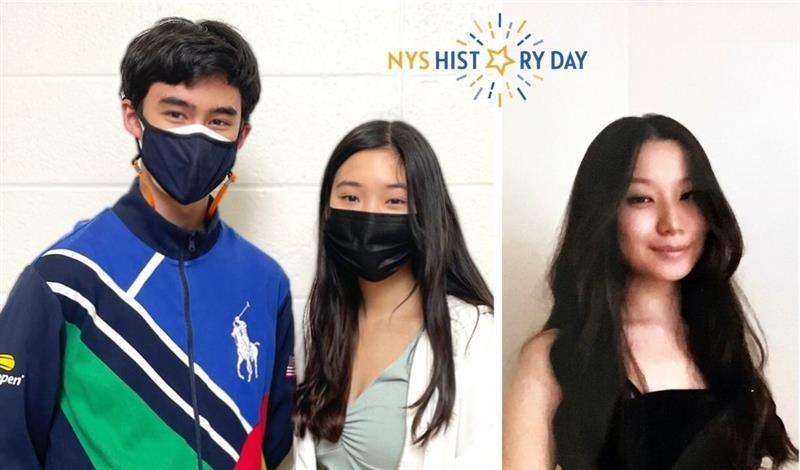Great Neck South “Makes History” at the National History Day Contest
Photo courtesy of GNPS website
Juniors Sebastian Lennox and Jillian Chang (left two students) won second place at the state National History Day contest; junior Melody Song (right) won third.
June 23, 2022
Great Neck South excelled at the recent New York State National History Day (NHD) contest: one group qualified for nationals and one individual was selected as a nationals alternate. The group consisting of juniors Sebastian Lennox and Jillian Chang placed second for their original website and will participate in the national competition, which will be held virtually from June 12 to June 16. Their project was titled “Fishin’ Wars: Reaffirming Native American Fishing Rights.” Junior Melody Song placed third at the competition with her video project titled “NHD News: Treaty of Versailles.”
NHD is an annual competition that involves creating a project that analyzes a historical event. Thousands of high school students participate each year, using primary sources and extensive historical research to support their project claims. Each year has a specific theme, which acts as a lens through which students analyze the historical events of their choosing. This year’s theme was “Debate and Diplomacy in History: Successes, Failures, Consequences.” The purpose of the theme was to encourage students to move beyond mere memorization of facts and dates and instead focus on historical perspectives, critical thinking, and understanding how and why certain events happened.
Lennox and Chang qualified for the national competition this year (their second year in a row), and their topic was about the series of “Fish-ins” during the 1960s hosted by Native Americans in protest of unfair fishing regulations. The Native Americans felt that they were oppressed because their fishing habits were wrongly regulated by state officials; they staged peaceful protests in response. “We decided to research this topic because of our study of US History and the lack of knowledge and appreciation for Native American history,” said Lennox. “Prior to researching topic ideas for NHD, we had no idea that this movement not only existed, but was supported by countless celebrities, including the likes of Marlon Brando and Dick Greggory.”
To analyze this topic, Lennox and Chang created a website consisting of numerous primary sources and interactive multimedia. Lennox enjoyed conducting research and creating the final product. “Watching the events unfold before our eyes in the words we wrote and found was a truly enjoyable experience. And seeing our project in its final stage, as a website that covered the context, event and effects of a life-changing movement was special.”
Song, who placed third, created a video of a news channel with an interviewer talking to important leaders involved in the Treaty of Versailles. After World War I, leaders from Italy, the United States, Britain, and France met in Paris to make a treaty. While they had different perspectives on how severely Germany should be punished, they decided to put full responsibility on Germany for starting the war. This was known as the “War Guilt Clause” and made the Treaty of Versailles very controversial. “I had just finished learning about World War I in my [AP US History] class, and I thought that doing the Treaty of Versailles would not only be a good review, but it would also be the most interesting and best fit for this year’s theme,” Song said.
Throughout her video project, Song acted out many characters, bringing their personalities and idiosyncrasies to life. “It was kind of like charades, where the audience would have to guess which character I was. For example, when I acted as Woodrow Wilson, I grabbed a chair for me to sit down on because Wilson was known to be paralyzed.” Song creatively used her voice and actions to portray different historical figures. “[George Clemenceau] is usually referred to as ‘Le Tigre’ for his ferocious political writing. When I played his character, my voice sounded more powerful and determined to bring out that ‘Le Tigre’ effect.”
Lennox hopes that more people will try the NHD competition. “I would love to see more students join the history club and participate in NHD,” Lennox stated. “The themes each year are quite broad, allowing a student to research any topic that they are interested in. And, with five different categories to choose from (paper, documentary, exhibit, performance, and website), students are free to express their ideas in any medium that they are comfortable with.”
Song agreed and felt that making the video was enjoyable. “I personally love acting, and so I really enjoyed the process of creating my project. Even if you don’t [like history], NHD offers different categories that allows you to utilize other interesting skills, such as acting or building a website.”






